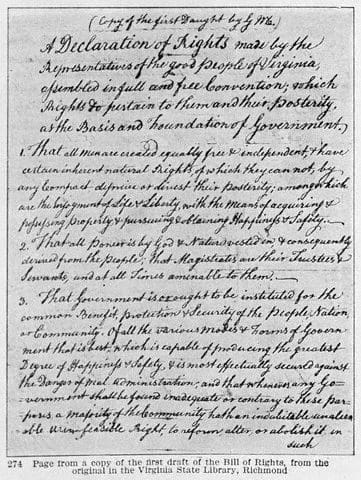US History Test Questions
Fighting in Lexington and Concord broke out between British soldiers and:
All of the following are parts of the Declaration of Independence EXCEPT
Cornwallis surrendered his army to Washington at the Battle of
The population at the beginning of the Revolution was divided almost equally between
The pamphlet, Common Sense, urged Americans to
The person accused of being a tyrant in the Declaration of Independence was
In the 1750's, the French became worried over possible British expansion into the
Advertisement
Here is an excerpt from a speech made at St. John's Church, Richmond, Virginia in March of 1775.
"The war is inevitable-and let it come! I repeat it, sir let it come! It is in vain, sir, to extenuate the matter. Gentleman may cry, Peace, peace; but there is no peace. The war is actually begun. The next gale that sweeps from the north will bring it our ears the clash of resounding arms. Our brethren are already in the field. Why stand we hare idle? What would they have? If life so dear, or peace so sweet, as to be purchased at the price of chains and slavery? Forbid it, Almighty God! I know not what course other may take, but as for me-give me liberty, or give me death!"
Who was the author of this speech?
Most colonists felt that British tax laws were unfair because
The Declaration of Independence stated that in a democracy, power comes from the

The battle which caused the French to sign the Franco-American alliance was
"We hold these truths to be self-evident, that all men are created equal, that they are endowed by their Creator with certain unalienable rights that among these are life, liberty, and the pursuit of happiness."
This quotation reflects the ideas mainly derived from
The purpose of the Proclamation of 1763 was to
John Locke's theory of the social contract as developed in the United State's Declaration of Independence stated that
Advertisement
The national legislative branch, as defined in the US Constitution, would consist of
i. two-house (bi-cameral) legislature
ii. House of Representatives whose membership was based on the population of a state
iii. Senate whose membership was based on two Senators per state
Those who supported the ratification of the United States' Constitution promised to add a Bill of Rights in order to
One way in which the United States Constitution differed from the Articles of Confederation was that the Constitution
George Washington's contribution to the Constitution were based on his
During the debate over the ratification of the Constitution, Federalists and Anti-Federalist disagreed MOST strongly over the
The Great Compromise and the Three-Fifths Compromise at the Constitutional Convention were both concerned with
The major reason the Bill of Rights was added to the Constitution was to
Advertisement
Who is called the "Father of the Constitution?"
Under the Articles of Confederation, the lack of a strong national government to deal with national problems can best be explained by the
The Virginia Declaration of Rights was written by

The Virginia Statute for Religious Freedom was written by
The Virginia Statute for Religious Freedom and the Virginia Declaration of Rights both
The Bill of Rights guarantees
The weaknesses of the Articles of Confederation included the national governments inability to
i. raise and army
ii. establish a uniform currency
iii. regulate interstate and foreign trade
Advertisement